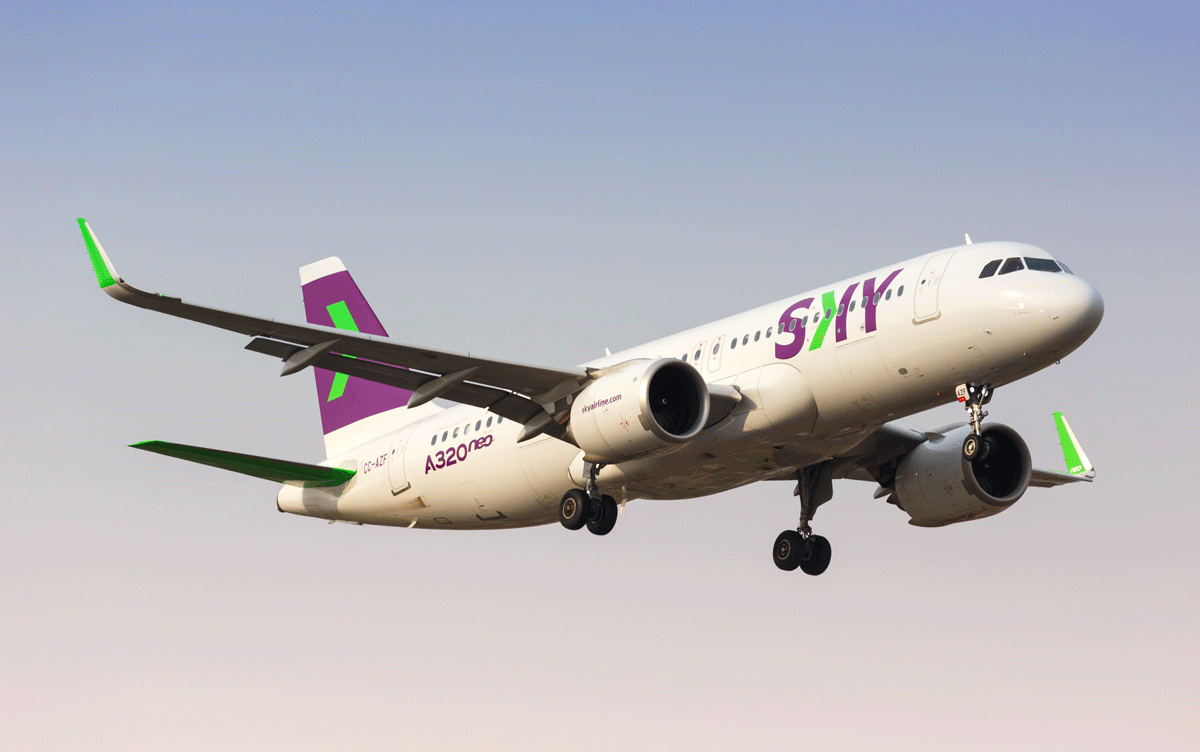SKY is a Chilean low-cost airline with more than 22 years of history. The company today operates 12 international and 28 domestic destinations from Santiago (Chile) and Lima (Peru) and plans to continue its expansion of both fleet and territories.
In 2022, the carrier was recognized as the best low-cost airline in South America by the international consulting firm Skytrax. Moreover, for the third consecutive year in 2023, the company received the recognition from CH-Aviation as the airline with the newest fleet in the Americas and the fourth worldwide – the average age of SKY’s fleet is around three years, which means one of the youngest fleets globally.
SKY is the only airline in the world with a 100% Airbus A320 and A321 NEO fleet, having reduced CO2 emissions per seat by 60% since 2010. Employing the all-NEO fleet allows the airline to be more efficient and sustainable, as these planes allow a 20% saving in fuel.
Julio Solar, Deputy Director of Strategic Planning and Alliances at Sky Airline, explained that the company was launched in 2001 as a charter company flying to Cuba and some domestic destinations, becoming a scheduled commercial airline in 2002. In 2015, Sky turned into a low-cost carrier (LCC), as this business model began to develop in Latin America.
 Effective business model
Effective business model
Since then, SKY has really taken off. Solar further explained that the company also differentiates by enhanced services and passenger comfort. “We don’t operate the ultra-low-cost carrier (ULLC) model. Our product resembles a legacy product, but our cost structure is that of an LCC which allows us to compete very well with the legacy carriers in the region. This is our key advantage.”
The company has also invested massively in its assets. In 2021, Sky Airline reached a milestone culminating the process of fleet renewal by having a 100% NEO fleet. Now an order for ten more machines has been placed. “We have already received the first Airbus 331, which has given us an advantage of time against our competitor, who is expecting the new machines only in two years’ time. Next year, we will receive eight more aircraft,” said Solar.
Jose Ignacio Dougnac, the company CEO, affirmed that the company is planning to grow the number of passengers by 2.5 over the next three years, with the business growing at the same rate. “In 2024, we hope to become twice the size we were in 2020.”
What is behind such steep growth? “Our strategy is to be convenient,” said Dougnac. “We want to be a very good alternative to full-service carriers and at the same time a very efficient company. We operate an LCC model, but with a special focus on customers and their comfort.”
To this end, the company has introduced a digital transformation programme that has allowed SKY to make the overall travel experience fast, easy, and personalized. As a result, digital self-service projects have been implemented at Nuevo Pudahuel Airport in Santiago and activated automatic check-in on SKY’s domestic flights in Chile and Peru.
Towards new territories
Dougnac acknowledged that SKY is growing both its domestic and international traffic. “In 2019, we were around 7% of international market share. This year, the figure has increased to between 14% and 15%. Similarly, our share of domestic travel has also increased.”
“As a milestone that reflects our goal to expand our horizons and improve connectivity in the region, we reached the United States for the first time, with the Lima – Miami route, in June 2022. We also launched multiple international routes from both Santiago and Lima and new domestic routes in both countries.”
He noted that SKY was the first airline to recover air traffic to pre-pandemic levels in Chile and Peru, with 7.1 million passengers carried in 2022, reflecting a 35% growth over 2019 levels. And more growth is in the pipeline, as defined in SKY’s Strategic Plan to 2030, which aims to expand growth in Latin America in a reliable, safe, and sustainable manner.
In 2023, SKY entered Uruguay with four new international routes, linking Montevideo with Santiago de Chile, Lima, Salvador de Bahía and Florianópolis. The expansions will provide affordable options and extend its network to over 40 destinations across the Americas.
Commenting on this recent expansion, Julio Solar said that SKY’s network development takes a holistic view of the industry and addresses two key concepts of the company’s strategic map: to be Latin America’s preferred airline and make the sky accessible to all. SKY today has the highest load factors in the industry, which shows a preference for its product.
 The friendly sky
The friendly sky
“What has kept the company growing much faster than the industry overall is its ability to bring to the region a very convenient price in a very good product. Our fleet has reclining seats, high onboard technology, and comfortable space. We are very efficient in terms of operations, we also have a broad network, and very good digital capabilities, ” said Dougnac, adding that to further boost SKY’s preference ratings, they will be launching a loyalty programme in 2024.
SKY is also planning to further improve its environmental footprint. In 2025, the airline will add the A321XLR, allowing SKY to open new routes across the region. These aircraft will change the industry’s ability to operate medium-range flights in a more efficient and environmentally friendly manner.
“This milestone will enable us to connect to more distant destinations, directly and non-stop, while continuing to significantly reduce the level of our emissions,” affirmed Dougnac. “What we have built to date allows us to look to the future with optimism and evolve towards a new SKY, even more aware of its impacts and its responsibility in creating value for the environment. We continue to work with a vision of sustainability aligned with our purpose: Making the sky available to everyone.”







